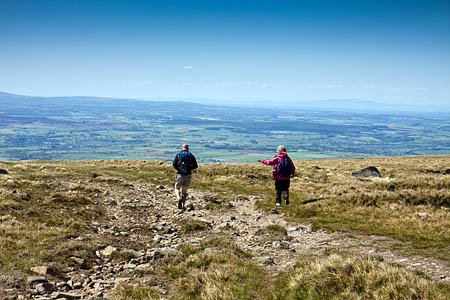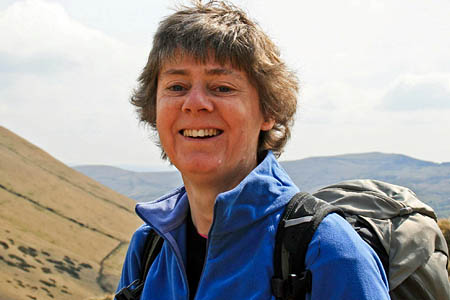
The white paper sets out the Government's plans for the outdoors and the health benefits nature gives
The coalition Government’s plans for the outdoors provoked a mixed response when they were published today.
Environment Secretary Caroline Spelman said the white paper on the natural environment would help this generation leave the UK’s countryside in a better state than it found it.
But outdoor enthusiasts’ bodies said it ignored access issues crucial to people’s enjoyment and Labour said it provides few clues about the Government’s plans on vital issues such as reforestation and worries about planning policy.
The 78-page document, entitled The Natural Choice, sets out the Government’s vision for the outdoors and natural environment, and builds on the recent UK National Ecosystem Assessment, which attempted to put a monetary value on the country’s great outdoors.
Environment Secretary Caroline Spelman said: “The natural environment matters to us all, not just because it makes us feel good when we stumble across a bluebell wood or spot a pair of goldfinches, but because we are now all able to see the terrible price we would pay if we lost what we have or neglected to care for it.
“Nature belongs to us all, and we’ve all got a vested interest in protecting it.
“That’s why the true value of nature should be built in to the decisions we make – as individuals, organisations, businesses and governments – so that we become the first generation to leave the environment in a better condition than we found it.”
Among measures proposed are 12 pilot Nature Improvement Areas in rural and urban locations providing sites for wildlife to live in and adapt to climate change. A £7.5m fund will enable their establishment.
The coalition Government also wants to set up a new Green Areas designation which, it says, will allow local communities to give protection to areas that are important to them for recreation, the view or their importance for wildlife.
The Department for the Environment, Food and Rural Affairs said the provision of outdoor activities for children should be improved. “Schools should be able to teach outdoors when they wish to do so. We will work with the Health and Safety Executive to remove unnecessary rules and other barriers to learning in the natural environment,” the white paper said.
Ms Spelman said: “In the past we have undervalued what our natural environment gives us.
“This white paper changes that, because we cannot afford to make the same mistakes again.
“We can all gain from the economic, social, and health benefits nature gives us, but we need to recognise that if we withdraw something from Mother Nature’s bank, we’ve got to put something back in to ensure that the environment has a healthy balance and a secure future.
“What I’d really like to see happening as a result of this white paper is more children enjoying nature and continuing that interest into adulthood, so that they pass that passion for the environment down through the generations. That would be a legacy well worth leaving.”
The Campaign for National Parks welcomed the broad thrust of the white paper, but warned the Government must put its money where its mouth is.
“The Campaign for National Parks applauds the Government on its new far-reaching vision to reconnect people with nature and properly account for the impacts of development on our natural environment,” a statement from the group said.
“We think that national parks, the authorities that run them, and the wide community-based partnerships they support, are extremely well placed to take a lead on making this happen, and also to be leaders on outdoor education, which was a major theme at the launch of the Government’s vision.”
But the campaign’s senior policy officer Christine Reid added: “While we welcome the Government’s excellent aspirations for environmental recovery, these must be backed up with enough resources and the right mechanisms if they are to be delivered.
“Conservation doesn’t come on the cheap and if the Government invests wisely in nature recovery now, we will all benefit in the future.”
The Northumberland National Park Authority pointed to its Cheviot Futures scheme as an example of communities, landowners and the public agencies combining to tackle some of the effects of climate change on the landscape.
Chief executive of the authority Tony Gates said “We know there is existing good practice to build on and much more that can be achieved. The natural environment white paper provides some important challenges and we look forward to working with local and national partners in meeting these.”
But Labour’s Shadow Environment Secretary Mary Creagh said: “Today’s natural environment white paper provides few clues about the Conservative-led Government’s plans for nature.
“The white paper fails to set out a clear plan for major challenges such as reforestation or biodiversity loss; nor does it deal with concerns about planning policy.
“The Tory-led Government needs to do better if it wants the public to believe it has the best interests of nature at heart. Its record so far does not bode well: a breathtaking attempt to sell-off England’s forests, plans to get rid of National Nature Reserves and an appalling 30 per cent cut to the frontline agencies that care for the environment.”
And two bodies representing outdoor enthusiasts expressed disappointment that public access to the countryside was lacking in the document.
The Ramblers and British Mountaineering Council said in a joint statement: “The white paper fails to fully recognise the important role that access and recreation play in facilitating the public’s understanding and enjoyment of the natural environment.”
Adrian Morris, Ramblers head of campaigns, said: “The Government underestimated public support for outdoor access and recreation during the forestry debacle. They must take note of the value of public access and seek to protect and enhance it, including access to the British coast.
“The fact that there is no mention of coastal access, and the future roll out of the English Coastal Path, is indicative of the Government’s apparent disregard for public access.
“We call on the Government to rectify this omission and clarify its commitment to coastal access for all.”
The English Coastal Path was one of the last outdoor provisions of the outgoing Labour administration and is due to be set up under the Marine and Coastal Access Act.
Catherine Flitcroft, BMC access and conservation officer, added: “For most people the value of the natural environment is not measured in terms of cost but from the sense of well being, physical and mental health benefits, as well as enjoyment.
“The tranquillity, wildness and cultural heritage of our landscape are values that must be taken into consideration when making decisions about the natural environment, particularly around planning and economic growth.”
The Open Spaces Society’s general secretary Kate Ashbrook said she was sceptical about provisions to simplify and streamline the process for making changes to public rights of way.
“OSS would strongly oppose any attempts to make it easier to alter the routes of public paths, which are highways in law. Already the legislation relating to route changes is biased in favour of owners and occupiers.
“Public paths are public property and we consider that they should only be altered when it is clearly in the public interest to do so. However, we support the implementation of the Natural England stakeholder group report, provided that it is implemented as a package and the recommendations are not cherry picked.”
She also questioned the commitment to open public spaces. “We feel strongly that the [Green Areas] designation must protect open spaces from all development and forever, and it should not replace existing legislation for registering land as town or village greens”
The full white paper can be seen on the Defra website.



andrew
08 June 2011This comment was removed in accordance with clause 4 of grough's terms and conditions
Dave
08 June 2011It's nice to see such a friendly out door type comment from andrew.
Yuk!
Hopefully he thought he was responding to an article in the Daily Mail, or perhaps BNP news.